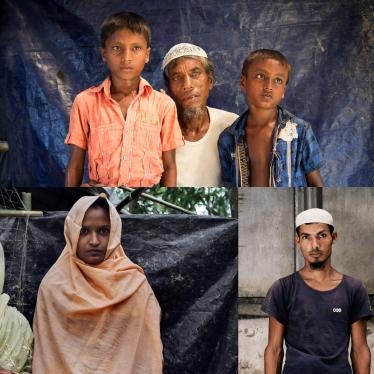(New York) - President Hamid Karzai should immediately enforce a program to provide truth, reconciliation and accountability for war crimes and major human rights abuses over the past 30 years in Afghanistan, Human Rights Watch said today. The Afghan government should establish a special court to try those responsible, some of whom hold high office, as soon as possible, Human Rights Watch said.
The Afghan government approved the Action Plan on Peace, Reconciliation and Justice on December 12, 2005, but delayed implementing it in part because Kabul and its international backers feared that calling for justice would further weaken Afghanistan's precarious security situation.
"The Afghan government and its foreign allies are finally moving against those who have brought such devastation for so long," said Sam Zarifi, Asia research director at Human Rights Watch. "Justice is vital for long-term stability. Afghans need to know the government can tackle the warlords and provide basic security, despite Taliban claims to the contrary."
For the past five years, the Afghan government, the United Nations and the international community, led by the United States, have pursued a counter-productive policy of relying on war criminals, human rights abusers, and drug-traffickers instead of prosecuting them, Human Rights Watch said. Karzai mistakenly tried to bring all political forces under his umbrella, while the US worked with many such individuals as part of its "war on terror."
The Action Plan outlines five "key actions" for implementing a transitional justice process to be completed by 2009:
- public commemoration of the Afghan people's suffering over three decades of war;
- vetting the civil service to keep out serious human rights abusers;
- documenting the events of the past to establish accountability;
- promotion of reconciliation and national unity; and
- establishment of a justice and accountability mechanism.
The Action Plan covers the period from the Soviet invasion of Afghanistan in 1979 through the bloody civil wars of the early 1990s and the rise and fall of the Taliban in 2001.
As documented by Human Rights Watch in its 2005 report, "Blood-Stained Hands: Past Atrocities in Kabul and Afghanistan's Legacy of Impunity," several of the worst perpetrators from Afghanistan's recent past are still active and engaging in widespread human rights abuses. Several highly placed members of the current Afghan government and legislature were implicated in war crimes during brutal fighting that killed or displaced hundreds of thousands of Afghans in the early 1990s and precipitated the rise of the Taliban. Most prominent among this group are parliamentarians Abdul Rabb al Rasul Sayyaf, Mohammed Qasim Fahim and Burhanuddin Rabbani, Minister of Energy Ismail Khan, Army Chief of Staff Abdul Rashid Dostum, and current Vice President Karim Khalili, all of whom continue to misuse positions of power.
Other perpetrators from the same era are now allied with the Taliban, such as Gulbuddin Hekmatyar, a major warlord based in southeastern Afghanistan. Current Taliban leaders such as Mullah Omar, Mullah Daudullah and Jalaluddin Haqqani first gained notoriety for their brutality in the late 1990s.
"For five years, the Afghan people have demanded justice for the crimes committed by the communists, the warlords, and the Taliban," said Zarifi. "The failure to provide justice has greatly eroded the legitimacy of the Afghan government and its international backers. The action plan is their chance to win back public support."
Human Rights Watch urged Karzai to immediately implement the Action Plan's vetting and accountability mechanisms, such as the establishment of a panel to advise the president on senior civil service appointments, such as provincial governors and police chiefs. This panel, which was to be established at the latest by August 2006, has not begun operating. Human Rights Watch also urged Karzai to name a high-level task force of Afghans and international experts who would recommend an accountability process.
Given the weak condition of Afghanistan's judiciary, Human Rights Watch renewed its call for a special court to provide accountability for major abusers from the past. To help maintain independence and guarantee international fair trial standards, Human Rights Watch recommended that the court be comprised of Afghan and international judges, with an international majority, and with an international prosecutor.
Human Rights Watch also urged the government to accelerate and redouble efforts to reform the judicial system and establish an independent judiciary.
Several cases under the doctrine of universal jurisdiction have proceeded outside the country against Afghan human rights abusers living abroad. In 2005, a UK court convicted Faryadi Zardad, a notorious warlord, of torturing Afghan civilians between 1991 and 1996, and sentenced him to 20 years in prison. Similarly, a Dutch court convicted Hesamuddin Hesam and Habibullah Jalalzoy, both high level members of KHAD, Afghanistan's infamous communist-era intelligence service, of engaging in torture and sentenced them to 12 years and nine years in prison, respectively.
As the Action Plan was announced, the United Nations Office of the High Commissioner for Human Rights (OHCHR) released its long-delayed report documenting human rights abuses and war crimes committed during Afghanistan's nearly 30 years of war.
"Karzai and the international community have tried, and failed, to establish peace without justice," said Zarifi. "Now it's time to hold the killers accountable."






